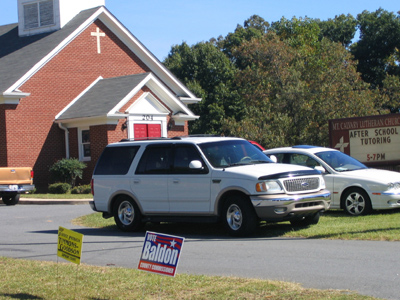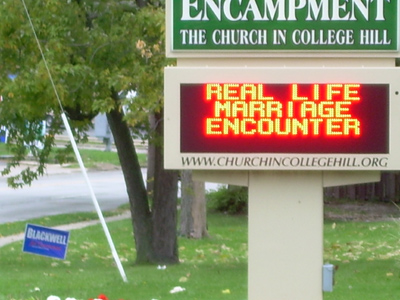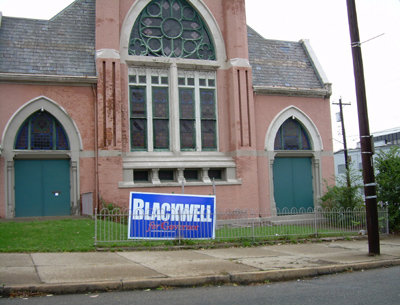
Four political yard signs were apparently unlawfully placed by the Mt. Calvary Lutheran Church in Kannapolis, N.C. Two signs supported a county commissioner, one endorsed a Supreme Court judge and a final sign endorsed a sheriff’s candidate. (Photo provided by complainant.)
The Encampment, a megachurch in Cincinnati, at one time had more than one large sign on its property endorsing a gubernatorial candidate who has become the darling of “patriot pastors.”
A second Cincinnati church, Mt. Auburn United Methodist Church, unlawfully placed this large campaign sign on its lawn. (Cincinnati photos by complainant Stephen Block.)
|
For the first time in its history, the Freedom From Religion Foundation took complaints this fall from members of the public who spotted partisan election signs in the yards of churches.
The Foundation reported three such violations to the IRS in a week’s time in October. The IRS code emphatically bars any partisan politicking or electioneering by tax-exempt entities.
Foundation member Stephen Block took snapshots of two different congregations in Cincinnati, Ohio, which were hosting political yard signs (or larger posters) endorsing gubernatorial candidate Ken Blackwell. A large group of liberal clergymen had asked the IRS twice this year to investigate irregularities by Ohio “patriot pastors” and a “restoration movement,” in which evangelical/fundamentalist clergy and congregations openly and illegally promoted the Republican’s candidacy.
Blackwell signs were spotted at The Encampment, a megachurch, and Mt. Auburn United Methodist Church, both in Cincinnati (see photos above).
A member of the public contacted the Foundation in October to report a variety of political yard signs on the property of Mt. Calvary Lutheran Church, in Kannapolis, N.C. (see photo). Although the Foundation contacted area media, there appeared to be no coverage about these churches flouting the law.
Foundation co-president Annie Laurie Gaylor documented each complaint in letters to Commissioner Mark W. Everson.
The Foundation earlier this year also called on the IRS to reform its rules permitting pastors carte blanche to attempt to influence the public on referenda questions. Clergy may sermonize without limit in support of bans on same-sex marriage or abortion, for instance, and use church bulletins to further influence voters in their congregations. That is why antigay referenda have passed in virtually every state they are introduced in: there are more politically conservative churches than liberal congregations, so the deck is stacked.
State regulations vary on whether churches must register with election boards if they take their message beyond their church walls. Such unregistered outreach rarely results in more than a wrist-slap.
The Foundation in October asked the State of Wisconsin Elections Board to investigate activities by Bill Bartz, pastor of the Monona Oaks Community Church. Bartz told local media that churches are exempt from registration requirements, even though the church leafletted hundreds of homes attempting to get voters to vote “yes” to an initiative to ban same-sex marriage and marriage-like benefits. The church also ran pro-referendum programs on local access TV, according to Foundation member Jim Guilfoil, who signed a complaint with the Wisconsin Democracy Campaign over the matter.



